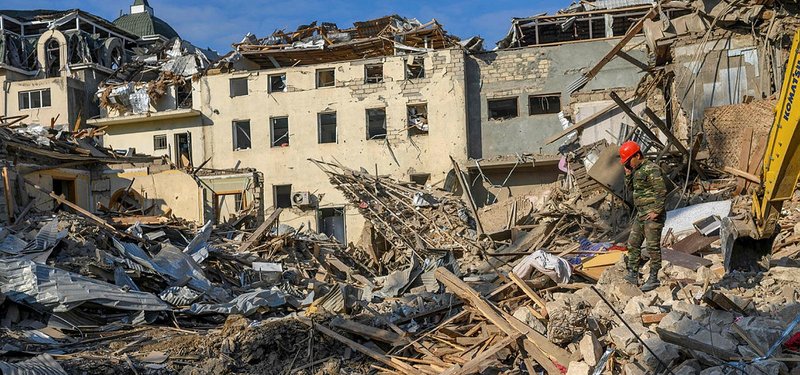
Aliyev aide urges OSCE to condemn deadly Armenian attacks on Ganja
"Armenia on one hand pleas for truce, but then commits an act of terrorism against civilians," Hikmet Hajiyev, assistant to the Azerbaijani president told a press conference in the capital Baku.
- World
- Agencies and A News
- Published Date: 05:03 | 11 October 2020
- Modified Date: 07:49 | 11 October 2020
A top Azerbaijani official on Sunday called on the international community and the OSCE Minsk Group, which carries out the Nagorno-Karabakh peace process, to condemn Armenian attacks in Ganja city despite a cease-fire.
"Armenia on one hand pleas for truce, but then commits an act of terrorism against civilians," Hikmet Hajiyev, assistant to the Azerbaijani president told a press conference in the capital Baku. He was accompanied by Azerbaijan prosecutor Kamran Aliyev.
While a building has been destroyed, at least nine civilians have been killed and several others injured in the Armenian attack.
"They resort to such acts to compensate for their failures on the battlefield," he said.
Calling on the global community to condemn and evaluate the missile attack, he said all information will be sent to international organizations.
"They should see how Azerbaijan is dealing with a coward, dishonest and despicable side [enemy]," he said, adding: "There are no moral or political or diplomatic limits for Armenia. The people of Azerbaijan saw this in 1992 in Khojaly."
The situation is different now, and Azerbaijan has a strong state and army, Hajiyev argued.
KARABAKH CONFLICT
Relations between the two former Soviet republics have been tense since 1991 when the Armenian military occupied Upper Karabakh, or Nagorno-Karabakh, an internationally recognized territory of Azerbaijan.
The recent clashes began on Sept. 27, when Armenian forces targeted civilian Azerbaijani settlements and military positions in the region, leading to casualties.
Four UN Security Council and two UN General Assembly resolutions, as well as many international organizations, demand the withdrawal of the occupying forces.
The OSCE Minsk Group -- co-chaired by France, Russia, and the US -- was formed in 1992 to find a peaceful solution to the conflict, but to no avail. A cease-fire, however, was agreed to in 1994.
A new armistice was agreed on Saturday to allow an exchange of prisoners and the recovery of bodies, but it has been violated by Armenia.
Turkey has supported Baku's right to self-defense and demanded the withdrawal of the occupying forces.

